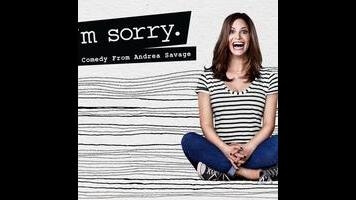The number of times Andrea Warren (Andrea Savage) mentions podcasting in the early episodes of I’m Sorry feels appropriate. Sitting down at a microphone to yuk it up with likeminded funny people is one of the easiest ways for a contemporary comedian like Andrea to get her name out there—as it has been for her counterparts in other semi-autobiographical sitcoms like Crashing and Maron, the latter of which sprung from and revolved around Marc Maron’s rebirth via WTF. But unlike those variations on the Curb Your Enthusiasm model, I’m Sorry really gives off the invitingly loose, chummy, riff-heavy vibe of a podcast. The casual camerawork—its handheld bobs and weaves another nod toward Curb’s undying influence—is almost incidental. I’m Sorry is the single-cam comedy you can listen to; it’s a podcast you can watch.
To downplay I’m Sorry’s visual elements would be to discount the expressive mug of its star and creator, the face frozen half in amusement, half in terror that pops out from truTV’s advertising campaign for the series. Savage has been paying her dues for years in comedy circles, a Groundlings alumna making her mark with supporting roles in beloved projects: she’s Veep’s President Laura Montez, and the therapist attempting to get Will Ferrell and John C. Reilly grow up in Step Brothers. I’m Sorry is a break akin to Judy Greer’s star turn Married, a “finally” moment for an actor who’s been solidly funny in other roles that are further down the callsheet. (In a pleasant surprise that also reopens the wound of Married’s premature cancellation, Greer shows up to play one of Andrea’s friends here.)
But also like Married, there’s a slightness to I’m Sorry that is both strength and weakness. It’s an eminently likable program, populated by other comedy ringers—Greer, Martin Mull, Jason Mantzoukas, Gary Anthony Williams, Nelson Franklin—who orbit Andrea and her husband, Mike (Tom Everett Scott). Early episodes establish Andrea’s ability to dig herself a hole—whether she’s haggling over air-conditioner temperatures in a fitness class or attempting to overcorrect her preschool-age daughter’s nascent racism—and keep on digging, but the complications tend to lead to a positive conclusion. It’s heartening to see a female character in the Larry David spot on a Curb Your Enthusiasm-style show, but that’s about where the novelty of I’m Sorry’s approach to the format ends. It follows the playbook well, though: I’m Sorry’s off-the-cuff exchanges might not yield a lot of killer zingers, but Andrea’s faux pas pile up to a satisfying payoff in the premiere episode.
Nonetheless, two recommendable attributes emerge across the four episodes screened for critics, both having to do with marriages at separate stages. Andrea and Mike’s relationship isn’t perfect, but after 10 years, they’re still plainly attracted to one another—they’re Laura and Rob Petrie with TV-MA vocabularies. (Furthering the Dick Van Dyke Show parallels, Mantzoukas plays Buddy and Sally rolled in one filthy-minded package as Andrea’s writing partner, Kyle.) And while it plays out mostly in the background, there’s a thread involving Andrea’s divorced parents (Kathy Baker and Martin Mull) that seems like it’s heading to potentially explosive territory later in the first season. In the immediate, it’s a reliable source for expressions of shock and dismay from Savage.
That’s I’m Sorry: Reliable, recommendable, satisfying, likable, consistent. For all the 2017 echoes it carries—that podcast energy; the Peak TV environment that allowed the erstwhile Court TV to pivot into the comedic programming that is now truTV’s bread and butter—it carries a hint of the retro, when a TV show could be “just good enough” and get by. It’s just a little bit of a letdown that Savage’s first major headlining project is just good enough. At least she wrote some amusing material for her and her friends.

